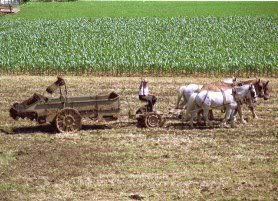Environment & Energy
Related: About this forumSustainable Farming: A Simple Fix, Zero Cost
http://readersupportednews.org/opinion2/271-38/14155-sustainable-farming-a-simple-fix-zero-costBy Mark Bittman, The New York Times
t's becoming clear that we can grow all the food we need, and profitably, with far fewer chemicals. And I'm not talking about imposing some utopian vision of small organic farms on the world. Conventional agriculture can shed much of its chemical use - if it wants to.
This was hammered home once again in what may be the most important agricultural study this year, although it has been largely ignored by the media, two of the leading science journals and even one of the study's sponsors, the often hapless Department of Agriculture.
The study was done on land owned by Iowa State University called the Marsden Farm. On 22 acres of it, beginning in 2003, researchers set up three plots: one replicated the typical Midwestern cycle of planting corn one year and then soybeans the next, along with its routine mix of chemicals. On another, they planted a three-year cycle that included oats; the third plot added a four-year cycle and alfalfa. The longer rotations also integrated the raising of livestock, whose manure was used as fertilizer.
The results were stunning: The longer rotations produced better yields of both corn and soy, reduced the need for nitrogen fertilizer and herbicides by up to 88 percent, reduced the amounts of toxins in groundwater 200-fold and didn't reduce profits by a single cent.
In short, there was only upside - and no downside at all - associated with the longer rotations. There was an increase in labor costs, but remember that profits were stable. So this is a matter of paying people for their knowledge and smart work instead of paying chemical companies for poisons. And it's a high-stakes game; according to the Environmental Protection Agency, about five billion pounds of pesticides are used each year in the United States
NoOneMan
(4,795 posts)Conventional farming is incredibly labor intensive and demands massive amounts of fresh water. Its also not incredibly energy efficient, as these plants must build their infrastructure from scratch every growing year. Drought resistant woody perennials are the real answer here (organic of course). On the plus side, at some point, the amount of energy it takes to harvest these crops drops dramatically; ask anyone with fruit trees in their backyard just how much they water and slave over them. ![]()
alittlelark
(18,890 posts)Kolesar
(31,182 posts)I read it in one of his books a few years ago. He is growing produce.
http://www.fourseasonfarm.com/
FedUpWithIt All
(4,442 posts)We need to change the way we do things back to a more natural way. It just works better and is better for us and the environment
tama
(9,137 posts)There are tons of studies about crop rotation methods in organic farming - at least in Europe - supporting this view, and plenty of other stuff.
Crop rotation does not, how ever, solve the US Mid West etc. biggest non-sustainable problem: irrigation. Ogallala will deplete in about 25 years, if it can survive the hunt for natural gas. A (partial) solution that works with nature instead of against it starts from creating microclimates that enhance the beneficial flow of water from ground to air and air to ground and maintaining water in top soil: trees!!! and biochar!!!
GliderGuider
(21,088 posts)Until then, it will remain an idea like a Pacala & Socolow climate mitigation wedge: technically and economically possible, but politically and commercially out of reach.
The real value in promoting it is that even before the collapse some smaller independent farmers may take heed, switch to better practices (water supplies permitting) and so improve the possibilities for their families and communities.
hunter
(38,318 posts)The birds eat all the bugs and we compost everything. (Dog pee helps too...)
We don't even have a snail problem anymore, not since the starlings arrived. Snails, a pest imported from Europe, used to be very bad before the starlings, another European import caught up with them.
It's not really fair to compare home gardening to large scale agriculture because in our household we easily bring in more nutrients from the grocery store and farmers markets than we export, even though most of those plant nutrients gets flushed down the toilet.
The nice thing about the sewage here is our state-of-the art sewage plant that produces fresh water, energy, and a sludge that is almost suitable for general agriculture but for the things we shouldn't be pouring down the drain in the first place.
With a few tweaks, treated sewage could replace livestock in these schemes.
Of course we may need the livestock...
